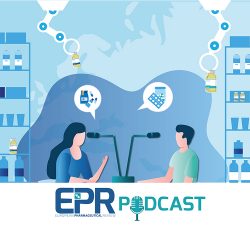
European Pharmaceutical Review podcast
EPR Podcast Episode 6 – Precision Medicine with Laetitia Decroix Guilloux and Edmond Chan, Janssen

With the market for precision medicine in oncology anticipated to value almost $150 billion by 2030 and the incidence of cancer only rising with the world’s aging population, European Pharmaceutical Review‘s Hannah Balfour sat down with industry experts Laetitia Guilloux and Edmond Chan from the Janssen Pharmaceutical Companies of Johnson & Johnson to find out more about this exciting field.
“Precision medicine is of particular interest because cancer is not homogeneous… precision medicine allows us to more effectively target specific tumour types based on genetic factors,” explains Laetitia, adding that there has been significant growth in precision medicine research over the past decade, particularly for haematology, since it has huge transformative potential. Edmond added that there are three elements to precision medicine: 1) identifying the correct patients for the treatment – precision in diagnosis, 2) giving each patient the best therapy – precision in treatment, and 3) how to monitor patient response – precision in outcome measurement. “I believe precision medicine is a combination of these three pillars and cannot be thought about one without the others,” says Edmond.

Laetitia Decroix Guilloux, Vice President EMEA Commercial Strategy Lead, Oncology, The Janssen Pharmaceutical Companies of Johnson & Johnson
Laetitia and Ed went give examples of the cancers currently being targeted with precision medicine by Janssen, including non-small cell lung cancer (NSCLC) and multiple myeloma, as well as prostate cancer. “If we want, one day, to be able to tackle those cancers [that are difficult to treat]… or even intercept it so early that we can be potentially curing them, and solid tumour is a little bit further away for that, precision medicine and especially the biomarker driven approach will be key,” states Laetitia, enforcing the importance of treatments such as chimeric antigen receptor (CAR) T-cell therapy.
She adds, “We are seeing continuous innovation across the precision medicine spectrum, so many of these technologies are incredibly exciting, and though we’ve made great strides, there are still challenges to overcome and things we can improve on to make them as effective as possible for patients.” For precision in monitoring, Edmond gives the example of developing blood tests, as an alternative to the more invasive bone marrow tests, for assessing minimal residual disease in multiple myeloma patients following treatment.

Edmond Chan, EMEA Therapeutic Area Lead, Haematology, The Janssen Pharmaceutical Companies of Johnson & Johnson
As we discussed the challenges when developing and implementing precision medicines in healthcare, Ed explained the importance of collaboration, particularly with patients: “If we take CAR T for example, CAR T is not the typical off the shelf medicine – it is a process involving many, many steps. The patient journey starts with finding the right patient, then the patients must be referred to a certified CAR-T centre, then blood must be taken for a T-cell extraction, these T-cells must be manufactured or trained to recognise the cancer, then the T cells must be reinfused back to the patient, and then monitoring afterwards. It is a process involving many, many steps and a huge time commitment from patients and their carers.”
When questioned about the challenges in terms of manufacturing precision medicine, Laetitia explained that by their very nature, personalised therapies have an impact on manufacturing “this is due to the fact that they have different requirements than more one-sized-fits-all treatments, so they can require additional expenditure on manufacturing infrastructure.” However, she emphasised that in future precision medicines may also help to optimise the use of healthcare resources and reduce cost overall as a result; “to reach this point, there is a need develop how we deliver autologous manufacturing of these treatments, particularly as precision medicines continue to become a bigger part of the landscape.”
To find out about Janssen’s work in the field of precision medicine, what Laetitia and Edmond believe precision medicine could look like in the next five to 10 years and more – listen to the episode!
We are looking at addressing the urgent need for new, tolerable, targeted therapy options for patients with certain NSCLC mutations… and researching whether there is a way to provide a treatment that can provide the same targeting [as CAR T] while also eliminating the training element” – Laetitia Guilloux
Please join the conversation and leave your thoughts in the comments – we love hearing your feedback – and look out for our next episode coming soon!
The post <em>EPR</em> Podcast Episode 6 – Precision Medicine with Laetitia Decroix Guilloux and Edmond Chan, Janssen appeared first on European Pharmaceutical Review.